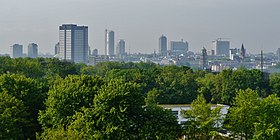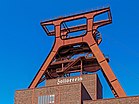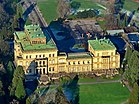
Back Essen, Duitsland Afrikaans Essen ALS ኧስን Amharic Essen AN إسن (ألمانيا) Arabic ايسسين ARZ Essen AST Essen Azerbaijani اسن AZB Эссен Bashkir
Essen | |
|---|---|
Clockwise from top: Skyline of the city, Essen Business District, Essen Minster, Villa Hügel, Essen Saalbau, UNESCO world heritage site Zollverein Coal Mine Industrial Complex, Borbeck Castle, ThyssenKrupp headquarters | |
| Coordinates: 51°27′3″N 7°0′47″E / 51.45083°N 7.01306°E | |
| Country | Germany |
| State | North Rhine-Westphalia |
| Admin. region | Düsseldorf |
| District | Urban district |
| Subdivisions | 9 districts, 50 boroughs |
| Government | |
| • Lord mayor (2020–25) | Thomas Kufen[1] (CDU) |
| Area | |
| • Total | 210.34 km2 (81.21 sq mi) |
| Elevation | 116 m (381 ft) |
| Population (2022-12-31)[2] | |
| • Total | 584,580 |
| • Density | 2,800/km2 (7,200/sq mi) |
| Time zone | UTC+01:00 (CET) |
| • Summer (DST) | UTC+02:00 (CEST) |
| Postal codes | 45001–45359 |
| Dialling codes | 0201, 02054 (Kettwig) |
| Vehicle registration | E |
| Website | www.essen.de |

Essen (German pronunciation: [ˈɛsn̩] ⓘ) is the central and, after Dortmund, second-largest city of the Ruhr, the largest urban area in Germany. Its population of 584,580 makes it the fourth-largest city of North Rhine-Westphalia after Cologne, Düsseldorf and Dortmund, as well as the ninth-largest city of Germany. Essen lies in the larger Rhine-Ruhr metropolitan region, second largest by GDP in the EU, and is part of the cultural area of Rhineland. Because of its central location in the Ruhr, Essen is often regarded as the Ruhr's "secret capital".[3] Two rivers flow through the city: the Emscher in the north, and in the south the Ruhr River, which is dammed in Essen to form the Lake Baldeney (Baldeneysee) and Lake Kettwig (Kettwiger See) reservoirs. The central and northern boroughs of Essen historically belong to the Low German (Westphalian) language area, and the south of the city to the Low Franconian Bergish area.
Essen is seat to several of the region's authorities, as well as to eight of the 100 largest publicly held German corporations by revenue, including three DAX-listed corporations. Essen is often considered the energy capital of Germany with E.ON and RWE, Germany's largest energy providers, both headquartered in the city. Essen is also known for its impact on the arts through the respected Folkwang University of the Arts, its Zollverein School of Management and Design, and the Red Dot industrial product design award. In early 2003, the universities of Essen and the nearby city of Duisburg (both established in 1972) were merged into the University of Duisburg-Essen with campuses in both cities and a university hospital in Essen. In 1958, Essen was chosen as the seat to the Roman Catholic Diocese of Essen (often referred to as Ruhrbistum (diocese of the Ruhr).
Founded around 845, Essen remained a small town within the sphere of influence of an important ecclesiastical principality, Essen Abbey, until the onset of industrialization. The city then—especially through the Krupp family's iron works—became one of Germany's most important coal and steel centers. Essen, until the 1970s, attracted workers from all over the country; it was the fifth-largest city in Germany between 1929 and 1988, peaking at over 730,000 inhabitants in 1962. Following the region-wide decline of heavy industries in the last decades of the 20th century, the city has seen the development of a strong tertiary sector of the economy. The most notable witness of this Strukturwandel (structural change) is the Zollverein Coal Mine Industrial Complex, which had once been the largest of its kind in Europe. Ultimately closed in 1993, both the coking plant and the mine have been listed by UNESCO as a World Heritage Site since 2001.
Notable accomplishments of the city in recent years include the title of European Capital of Culture on behalf of the whole Ruhr area in 2010 and the selection as the European Green Capital for 2017.[4]
- ^ Wahlergebnisse in NRW Kommunalwahlen 2020 Archived 17 May 2022 at the Wayback Machine, Land Nordrhein-Westfalen, accessed 19 June 2021.
- ^ "Bevölkerung der Gemeinden Nordrhein-Westfalens am 31. Dezember 2022 – Fortschreibung des Bevölkerungsstandes auf Basis des Zensus vom 9. Mai 2011" (in German). Landesbetrieb Information und Technik NRW. Retrieved 20 June 2023.
- ^ "Heimatabend Essen – Die heimliche Hauptstadt des Ruhrgebiets" (in German). 10 September 2014. Archived from the original on 17 April 2021. Retrieved 19 June 2020.
- ^ "European Green Capital". ec.europa.eu. Archived from the original on 20 May 2017. Retrieved 12 May 2017.
© MMXXIII Rich X Search. We shall prevail. All rights reserved. Rich X Search












